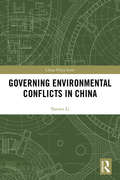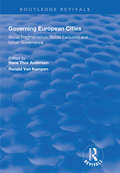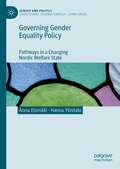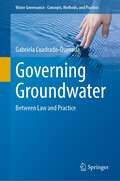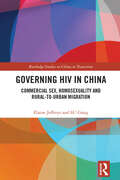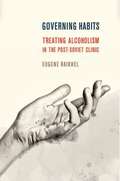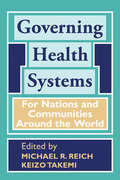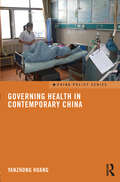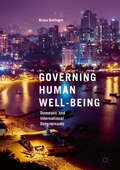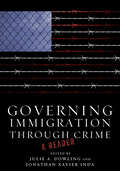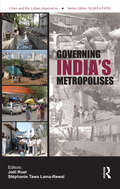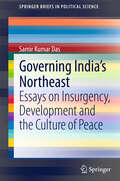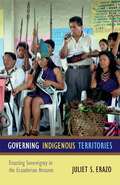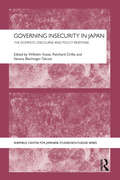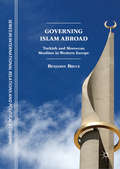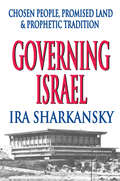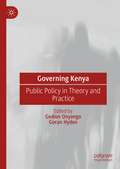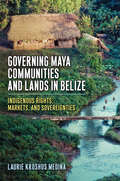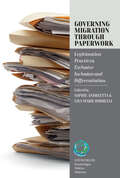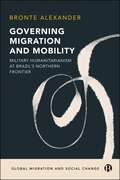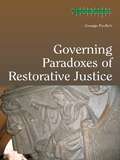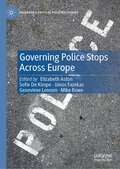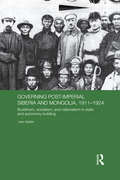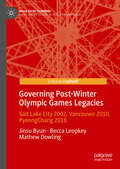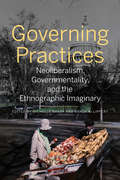- Table View
- List View
Governing Environmental Conflicts in China (China Policy Series)
by Yanwei LiEnvironmental conflicts are the source of many large-scale popular protests in China, with some protests substantially endangering social order. Such protests have often prompted severe counter measures by both national and local government, but have often then gone on to result in compromises whereby the demands of protesters have been largely met. This book considers the nature of environmental conflicts in China and the way in which national and local governments have handled the situations. It includes detailed case studies of particular conflicts, relates the governance of environmental conflicts in China to wider discussions on the nature of governance and examines under what conditions government in China makes compromises. The book concludes by assessing the lessons for the future.
Governing European Cities: Social Fragmentation, Social Exclusion and Urban (Routledge Revivals)
by Hans Thor AndersenThis title was first published in 2001. This volume is a result of the action COST A9 "Civitas - Transformation of European Cities and Urban Governance", launched in 1995, which looks at the emergence of the urban question. The COST framework is a European mechanism to provide scientific and technical assistance for national research programmes. The text covers the change in the importance of European cities and analyzes how each city re-formulates its policies and methods of governing in response to these changes. This text is to analyze the new forms of urban governance using three points of view, a statistical approach, an economic approach and a sociological approach. This book tackles the fragmentation and social exclusion that occurs in urban society and explores the different forms it takes throughout Europe. It also presents some strategies to combat or at least regulate this fragmentation, to ensure a united European city.
Governing Gender Equality Policy: Pathways in a Changing Nordic Welfare State (Gender and Politics)
by Anna Elomäki Hanna YlöstaloThis book analyses the effects of public governance reforms on gender equality policy in Finland. Recent economic crises, rising austerity and increasing opposition to gender equality have led to the defunding of gender equality bodies, and the side-lining of gender equality as a political goal. This policy backlash has taken place alongside transformations to the state and governance, that have changed the discourses, knowledge, actors, and practices of gender equality policy. This book contributes to these discussions by demonstrating the subtleties of the constantly changing governance reform agendas, their operation in practice, and how they intertwine with other elements of the gender equality policy backlash. It is based on more than 100 interviews with civil servants, politicians, non-governmental organisations, social partners, and think tanks, and a broad range of policy documents and media material. It will appeal to students and scholars of gender studies, public policy and governance.
Governing Groundwater: Between Law and Practice (Water Governance - Concepts, Methods, and Practice)
by Gabriela Cuadrado-QuesadaThis book empirically examines a diverse range of groundwater issues and different approaches to deal with such concerns taking into account responses from government bodies, community organizations, scientists, private sector, and academia. The overarching objective of this book is to empirically examine groundwater governance and groundwater law. It aims to provide a better understanding of the complexities surrounding groundwater governance in order to reconceptualize and retheorize the governance of subterranean resources having as entry points equity and sustainability concerns. This involves understanding what people do when using, sharing, protecting, and measuring groundwater; and why do they do what they do, i.e., what are their motivations to resort to certain practices. This is done through the comparative and contrasting investigation of six case studies from countries from the Global North and Global South. It offers a different perspective of literature given that it explains how groundwater governance and law are in practice rather than what they should be. Additionally, the research presented in this book provides ideas on how to rethink the design and implementation of groundwater law grounded on empirically based descriptions and the understanding of groundwater problems.
Governing HIV in China: Commercial Sex, Homosexuality and Rural-to-Urban Migration (Routledge Studies on China in Transition)
by Gang Su Elaine JeffreysHIV and AIDS have long been problematized in the People’s Republic of China as objects of governance in political frameworks and institutions. The state’s attitudes towards health programs have, nevertheless, changed significantly during the 21st century. Pilot programs at the beginning of the century, which focused on underground sex workers, have now developed into the roll-out of a nationwide program, with supportive legislation and broadcast media publicity. This book therefore examines China’s evolving AIDS response, providing an up to date investigation into the positions and practices of the state. It explains the origins, rationales and implementation of initiatives focused on female sex workers and explores the extension of such initiatives to include other populations identified as key to ending the AIDS epidemic, especially homosexual men and rural-to-urban migrant labourers. Ultimately, through an analysis of the different approaches to the governance of commercial sex and sexual health, Governing HIV in China concludes by considering the challenges raised by China’s commitment to the United Nations’ vision of ending AIDS as a global health threat by 2030. This book will be useful for students and scholars of Social Policy, Public Health Policy and Chinese Studies.
Governing Habits: Treating Alcoholism in the Post-Soviet Clinic
by Eugene RaikhelCritics of narcology—as addiction medicine is called in Russia—decry it as being "backward," hopelessly behind contemporary global medical practices in relation to addiction and substance abuse, and assume that its practitioners lack both professionalism and expertise. On the basis of his research in a range of clinical institutions managing substance abuse in St. Petersburg, Eugene Raikhel increasingly came to understand that these assumptions and critiques obscured more than they revealed. Governing Habits is an ethnography of extraordinary sensitivity and awareness that shows how therapeutic practice and expertise is expressed in the highly specific, yet rapidly transforming milieu of hospitals, clinics, and rehabilitation centers in post-Soviet Russia. Rather than interpreting narcology as a Soviet survival or a local clinical world on the wane in the face of globalizing evidence-based medicine, Raikhel examines the transformation of the medical management of alcoholism in Russia over the past twenty years.Raikhel's book is more than a story about the treatment of alcoholism. It is also a gripping analysis of the many cultural, institutional, political, and social transformations taking place in the post-Soviet world, particularly in Putin's Russia. Governing Habits will appeal to a wide range of readers, from medical anthropologists, clinicians, to scholars of post-Soviet Russia, to students of institutions and organizational change, to those interested in therapies and treatments of substance abuse, addiction, and alcoholism.
Governing Health Systems: For Nations and Communities Around the World
by Michael Reich Keizo TakemiGoverning Health Systems: For Nations and Communities Around the World examines the complex relationships between governance and performance in community and national health systems. Each chapter provides an in-depth case study, using both qualitative and quantitative methods, on health systems in many countries, including Uganda, Ghana, India, Zambia, Japan, Nigeria, Indonesia, Brazil, Palestine, and South Korea. The chapters were written by former Takemi Fellows, who were mid-career research fellows at the Harvard School of Public Health, and their colleagues. This case study approach yields important findings as well as contextual insights about the challenges and accomplishments in addressing governance issues in national and community health systems around the world. Health policymakers around the world are struggling to address the multiple challenges of governing health systems. These challenges also represent important themes for the research mission of the Takemi Program in International Health at the Harvard School of Public Health. This book is based on the program's thirtieth anniversary symposium held in October 2013 at Harvard. The studies presented in this book--deep examinations of illustrative examples of health system governance for communities and nations--contribute to our knowledge about global health and assist policymakers in dealing with the complex practical problems of health systems. In short, this book addresses central questions about governing health systems--and why governance matters.
Governing Health in Contemporary China (China Policy Series)
by Yanzhong HuangThe lack of significant improvement in people’s health status and other mounting health challenges in China raise a puzzling question about the country’s internal transition: why did the reform-induced dynamics produce an economic miracle, but fail to reproduce the success Mao had achieved in the health sector? This book examines the political and policy dynamics of health governance in post-Mao China. It explores the political-institutional roots of the public health and health care challenges and the evolution of the leaders’ policy response in contemporary China. It argues that reform-induced institutional dynamics, when interacting with Maoist health policy structure in an authoritarian setting, have not only contributed to the rising health challenges in contemporary China, but also shaped the patterns and outcomes of China’s health system transition. The study of China’s health governance will further our understanding of the evolving political system in China and the complexities of China’s rise. As the world economy and international security are increasingly vulnerable to major disease outbreaks in China, it also sheds critical light on China’s role in global health governance.
Governing Human Well-Being
by Nisha BellingerThis book provides a comprehensive explanation of human well-being outcomes by analyzing the role of domestic and international political factors. The well-being outcomes under study are the building blocks of development, and play a crucial developmental role in the lives of citizens, states, and the global community. The project introduces cases from Brazil, Japan, China, and Iraq, and proposes to answer some of the pressing questions that scholars and policy-makers alike have pondered over for years. Why are there large disparities between countries in the quality of life people lead? What factors account for the general well-being of mankind? How do we improve human lives?
Governing Immigration Through Crime: A Reader
by Julie A. Dowling Jonathan Xavier IndaIn the United States, immigration is generally seen as a law and order issue. Amidst increasing anti-immigrant sentiment, unauthorized migrants have been cast as lawbreakers. Governing Immigration Through Crime offers a comprehensive and accessible introduction to the use of crime and punishment to manage undocumented immigrants. Presenting key readings and cutting-edge scholarship, this volume examines a range of contemporary criminalizing practices: restrictive immigration laws, enhanced border policing, workplace audits, detention and deportation, and increased policing of immigration at the state and local level. Of equal importance, the readings highlight how migrants have managed to actively resist these punitive practices. In bringing together critical theorists of immigration to understand how the current political landscape propagates the view of the "illegal alien" as a threat to social order, this text encourages students and general readers alike to think seriously about the place of undocumented immigrants in American society.
Governing India's Metropolises: Case Studies of Four Cities (Cities and the Urban Imperative)
by Stéphanie Tawa Lama-Rewal Joël RuetThis book is a comparative, sector-based study of the changing character of governance in Indian metropolises in the 2000s. Highlighting the horizontal and vertical ties of the participatory groups, both state and non-state, it looks at key civic issues.
Governing India's Northeast
by Samir Kumar DasThis book focuses on issues of governance and the nature and complexities of social transformation in India's Northeast -- a 'problem' zone for policymakers -- particularly since the early 1990s. While governance is the thread that runs through the volume, the latter at one level addresses the challenges of governing in global times a region historically marked by acute violence, interethnic conflict and insurgency; and at another, traces macro changes in the very forms and technologies of governance. The essays in this volume point to how changing forms and technologies of governing insurgency, development and culture do not remain mere instruments of peace, but define the very nature and content of both peace and conflict and their interrelationship in the region.For the first time in the history of scholarship on the region, the three crucial issues of insurgency, development and culture have been analysed through the lens of governance. This volume, therefore, marks an important addition to the scholarship on the region.
Governing Indigenous Territories: Enacting Sovereignty in the Ecuadorian Amazon
by Erazo Juliet S.Governing Indigenous Territories illuminates a paradox of modern indigenous lives. In recent decades, native peoples from Alaska to Cameroon have sought and gained legal title to significant areas of land, not as individuals or families but as large, collective organizations. Obtaining these collective titles represents an enormous accomplishment; it also creates dramatic changes. Once an indigenous territory is legally established, other governments and organizations expect it to act as a unified political entity, making decisions on behalf of its population and managing those living within its borders. A territorial government must mediate between outsiders and a not-always-united population within a context of constantly shifting global development priorities. The people of Rukullakta, a large indigenous territory in Ecuador, have struggled to enact sovereignty since the late 1960s. Drawing broadly applicable lessons from their experiences of self-rule, Juliet S. Erazo shows how collective titling produces new expectations, obligations, and subjectivities within indigenous territories.
Governing Insecurity in Japan: The Domestic Discourse and Policy Response (The University of Sheffield/Routledge Japanese Studies Series)
by Reinhard Drifte Wilhelm Vosse Verena Blechinger-TalcottSince the end of the Cold War, Japan's security environment has changed significantly. While, on the global level, the United States is still Japan's most important security partner, the nature of the partnership has changed as a result of shifting demands from the United States, new international challenges such as the North Korean nuclear programme and the rapid rise of China. At the same time, Japan has been confronted with new, ‘non-traditional’ security threats such as international terrorism, the spread of infectious diseases, and global environmental problems. On the domestic level, demographic change, labour migration, economic decline, workplace insecurity, and a weakening impact of policy initiatives challenge the sustainability of the lifestyle of many Japanese and have led to a heightened sense of insecurity among the Japanese public. This book focuses on the domestic discourse on insecurity in Japan and goes beyond military security. The chapters cover issues such as Japan’s growing perception of regional and global insecurity; the changing role of military forces; the perceived risk of Chinese foreign investment; societal, cultural and labour insecurity and how it is affected by demographic changes and migration; as well as food insecurity and its challenges to health and public policy. Each chapter asks how the Japanese public perceives these insecurities; how these perceptions influence the public discourse, the main stakeholders of this discourse, and how this affects state-society relations and government policies. Governing Insecurity in Japan provides new insights into Japanese and international discourses on security and insecurity, and the ways in which security is conceptualized in Japan. As such, it will be of interest to students and scholars working on Japanese politics, security studies and international relations.
Governing Islam Abroad: Turkish And Moroccan Muslims In Western Europe (The\sciences Po Series In International Relations And Political Economy Ser.)
by Benjamin BruceFrom sending imams abroad to financing mosques and Islamic associations, home states play a key role in governing Islam in Western Europe. Drawing on over one hundred interviews and years of fieldwork, this book employs a comparative perspective that analyzes the foreign religious activities of the two home states with the largest diaspora populations in Europe: Turkey and Morocco. The research shows how these states use religion to promote ties with their citizens and their descendants abroad while also seeking to maintain control over the forms of Islam that develop within the diaspora. The author identifies and explains the internal and foreign political interests that have motivated state actors on both sides of the Mediterranean, ultimately arguing that interstate cooperation in religious affairs has and will continue to have a structural influence on the evolution of Islam in Western Europe.
Governing Israel: Chosen People, Promised Land and Prophetic Tradition
by Ira SharkanskyIsraeli politics and policymaking reflect themes long imbedded in Jewish culture. The concepts of Chosen People and Promised Land, and their meaning in Christian as well as Jewish religious traditions, assure that Israel is perpetually in the international spotlight. They also impose a sense of distinctiveness on the Israeli population. Some Israelis trumpet their country's accomplishments with unrestrained superlatives. Social critics accuse Israel of having the worst of the world's conditions. In this they reflect another trait that seems to have been inherited from the ancients: the prophetic tradition of extreme self-criticism. In reality, much of what occurs in Israel is similar to what occurs in countries that share its characteristics: democracy, western culture, and an advanced level of economic development. Such an idea may seem bizarre alongside headlines about suicide bombings and the country's aggressive defensive posture. This misses what is normal about Israel. In Israel policymakers weigh benefits and costs of various options, and generally choose something moderate, just as they do elsewhere. But this reality does not dim the rhetoric of politics, where hyperbole frequently seems more evident than rational discourse. Sharkansky discusses three central issues in Israeli public affairs: religion, national security, and social policy. He describes how policymakers relate to these issue and themes. Major problems may not be solved, but they are managed in a way that is tolerable. It is in this trait that Israel resembles other western democracies. In sum, biblical themes affect Israel's political rhetoric more than they affect the way officials actually work out their problems. Pragmatic coping with worldly realities generally overcomes emotional expressions that convey ingredients of spirituality.
Governing Kenya: Public Policy in Theory and Practice
by Goran Hyden Gedion OnyangoThis book is authored by some of the renowned scholars in Africa who take on the task to understand how Kenya is governed in this century from a public policy perspective. The book’s public policy approach addresses three general and pertinent questions: (1) how are policies made in a political context where change is called for, but institutional legacies tend to stand in the way? (2) how are power and authority shared among institutional actors in government and society? and, (3) how effective is policymaking at a time when policy problems are becoming increasingly complex and involving multiple stakeholders in Africa? This book provides an updated and relevant foundation for teaching policy, politics and administration in Kenya. It is also a useful guide for politicians, the civil society, and businesses with an interest in how Kenya is governed. Furthermore, it addresses issues of comparability: how does the Kenyan case fit into a wider African context of policymaking? ‘This volume is a major contribution to comparative policy analysis by focusing on the policy processes in Kenya, a country undergoing modernization of its economic and political institutions. Written by experts with a keen eye for the commonalities and differences the country shares with other nations, it covers a range of topics like the role of experts and politicians in policymaking, the nature of public accountability, the impact of social media on policy actors, and the challenges of teaching policy studies in the country. As a first comprehensive study of an African nation, Governing Kenya will remain a key text for years to come’. —Michael Howlett, Burnaby Mountain Chair of Political Science, Simon Fraser University, Canada ‘A superb example of development scholarship which sets aside ‘best practice’ nostrums and focuses on governance challenges specific to time and place while holding on to a comparative perspective. Useful to scholars and practitioners not only in Kenya but across developing areas. I strongly recommend it!’ —Brian Levy teaches at the School of Advanced International Studies, Johns Hopkins University, USA, and the University of Cape Town, South Africa. ‘This book is an exploration of important deliberations - of interest for those of us interested in deepening the understanding of public policy theories and their application within a specific African setting’. —Wilson Muna, Lecturer of Public Policy, Kenyatta University, Nairobi, Kenya ‘This collection of think pieces on public policy in Kenya gives the reader theoretical and practical hooks critical to the analysis of the implementation of the sovereign policy document in Kenya, the 2010 Constitution’. —Willy Mutunga, Chief Justice & President of the Supreme Court, Republic of Kenya, 2011-2016 ‘Governing Kenya provides a comprehensive analysis of public policymaking in Kenya. The book integrates public policy theory with extensive empirical examples to provide a valuable portrait of the political and economic influences on policy choices in this important African country. The editors have brought together a group of significant scholars to produce an invaluable contribution to the literature on public policy in Africa’. —B. Guy Peters, Maurice Folk Professor of American Government, University of Pittsburgh, USA
Governing Maya Communities and Lands in Belize: Indigenous Rights, Markets, and Sovereignties
by Laurie Kroshus MedinaConfronting a debt crisis, the Belizean government has strategized to maximize revenues from lands designated as state property, privatizing lands for cash crop production and granting concessions for timber and oil extraction. Meanwhile, conservation NGOs have lobbied to establish protected areas on these lands to address a global biodiversity crisis. They promoted ecotourism as a market-based mechanism to fund both conservation and debt repayment; ecotourism also became a mechanism for governing lands and people—even state actors themselves—through the market. Mopan and Q’eqchi’ Maya communities, dispossessed of lands and livelihoods through these efforts, pursued claims for Indigenous rights to their traditional lands through Inter-American and Belizean judicial systems. This book examines the interplay of conflicting forms of governance that emerged as these strategies intersected: state performances of sovereignty over lands and people, neoliberal rule through the market, and Indigenous rights-claiming, which challenged both market logics and practices of sovereignty.
Governing Migration Through Paperwork: Legitimation Practices, Exclusive Inclusion and Differentiation (Lifeworlds: Knowledges, Politics, Histories #6)
by Lisa Marie Borrelli Sophie AndreettaTo better understand migration governance and the concrete, daily practices of civil servants tasked with enforcing state laws and policies, it is important to focus on documents, which are core artefacts of bureaucratic work. These can include certificates, letters, reports, case files, decisions, internal guidelines and judgements in both digital and paper form. Based on ethnographic studies in various geographical and bureaucratic contexts, this collection shows how civil servants produce statehood, restrict migrants’ movements and engage with migrants’ strategies to make themselves legible. It contributes to the study of the state as documentary practice and highlights the role of paperwork as a powerful practice of migration control.
Governing Migration and Mobility: Military-Humanitarianism at Brazil's Northern Frontier (Global Migration and Social Change)
by Bronte AlexanderAs the world faces unprecedented levels of displacement with over 100 million people forced to flee conflict, economic instability and climate crises, responses to migration have become increasingly complex. This book examines the military-humanitarian strategies used to manage the movement of people on the move, focusing on the migration of Venezuelans to northern Brazil. By developing the concept of ‘debilitating mobilities,’ the book explores mobility governance through border security, urban control and shelter provision. Shedding light on the intersecting logics of aid, security and vulnerability, this book reveals the multiscalar governance of migration in precarious environments.
Governing Paradoxes of Restorative Justice
by George PavlichRestorative justice is the policy of eschewing traditional punishments in favour of group counselling involving both victims and perpetrators. Until now there has been no critical analysis of governmental rationales that legitimize restorative practices over traditional approaches but Governing Practices of Restorative Justice fills this gap and addresses the mentalities of governance most prominent in restorative justice. The author provides comprehensible commentary on the central images of this discursive arena in a style accessible to participants and observers alike of restorative justice.
Governing Police Stops Across Europe (Palgrave's Critical Policing Studies)
by Elizabeth Aston Mike Rowe Genevieve Lennon Sofie De Kimpe János FazekasThis book takes a critical and comparative approach to the analysis of the governance of police stops across Europe. It draws on an EU COST Action research network on Police Stops which engaged academics and practitioners from 29 countries to better understand the practice of police stops. It begins by examining how police stops are defined and the various legal rules and levels of accountability afforded. The chapters are arranged by theme to focus on a core aspect of the governance of police stops. These include: legal frameworks and police discretion; internal governance; external accountability and civilian oversight; possibilities for legal recourse; and the different roles of data and technology. Each compares the distinct approaches evident across Europe, often employing case studies. The book adopts a critical approach, acknowledging governance as contested and involving diverse (state, non-state and supranational) actors. It considers implications for policing in a rapidly changing environment globally.
Governing Post-Imperial Siberia and Mongolia, 1911-1924: Buddhism, Socialism and Nationalism in State and Autonomy Building (Routledge Studies in the History of Russia and Eastern Europe)
by Ivan SablinThe governance arrangements put in place for Siberia and Mongolia after the collapse of the Qing and Russian Empires were highly unusual, experimental and extremely interesting. The Buryat-Mongol Autonomous Socialist Soviet Republic established within the Soviet Union in 1923 and the independent Mongolian People’s Republic established a year later were supposed to represent a new model of transnational, post-national governance, incorporating religious and ethno-national independence, under the leadership of the coming global political party, the Communist International. The model, designed to be suitable for a socialist, decolonised Asia, and for a highly diverse population in a strategic border region, was intended to be globally applicable. This book, based on extensive original research, charts the development of these unusual governance arrangements, discusses how the ideologies of nationalism, socialism and Buddhism were borrowed from, and highlights the relevance of the subject for the present day world, where multiculturality, interconnectedness and interdependency become ever more complicated.
Governing Post-Winter Olympic Games Legacies: Salt Lake City 2002, Vancouver 2010, PyeongChang 2018 (Mega Event Planning)
by Mathew Dowling Jinsu Byun Becca LeopkeyThis book provides a comprehensive analysis of post-Games legacy governance including stakeholder relationships, institutional conditions, and policy environments, while also empirically exploring the modes of governance employed by select cases of the Winter Olympic Games. This work offers insights to help practitioners develop and manage the governance of legacy more effectively. Theoretical and methodological implications, as well as future avenues of research are suggested.
Governing Practices: Neoliberalism, Governmentality, and the Ethnographic Imaginary
by Randy K. Lippert Michelle BradyNeoliberalism is among the most commonly used concepts in the social sciences. Furthermore, it is one of the most influential factors that have shaped the formation of public policy and politics. In Governing Practices, Michelle Brady and Randy Lippert bring together prominent scholars in sociology, criminology, anthropology, geography, and policy studies to extend and refine the current conversation about neoliberalism. The collection argues that a new methodological approach to analyzing contemporary policy and political change is needed. United by the common influence of Foucault's governmentality approach and an ethnographic imaginary, the collection presents original research on a diverse range of case studies including public-private partnerships, the governance of condos, community and state statistics, nanopolitics, philanthropy, education reform, and pay-day lending. These diverse studies add considerable depth to studies on governmentality and neoliberalism through a focus on governmental practices that have not previously been the focus of sustained analysis.
